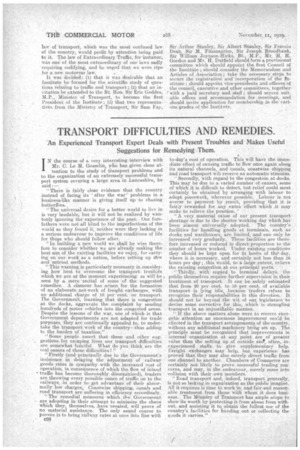TRANSPORT DIFFICULTIES AND REMEDIES.
Page 18

If you've noticed an error in this article please click here to report it so we can fix it.
An Experienced Transport Expert Deals with Present Troubles and Makes Useful Suggestions for Remedying Them.
IN the Course of a very interesting interview with Mr. C. Le M. Gosselin, who has.given close attention to the study of transport problems and to the organization of an extremely successful transport system covering a large area in „Lancashire, he
said :—., ,. " There is fairly clear evidence that the country instead of facing its 'after the war' problems in a business-like manner is giving itself up to -chasing butterflies.. "The universal desire for a, better world to live in is very laudable, but it will not be realized by wantonly ignoring the experience of the past. Our forefathers were not all blind to the imperfections of the world as they found it, neither were they lacking in a serious endeavour to improve the conditions of life for thoae who should follow after.
"In building a new world we shall be wise therefore to consider 'hether we are already making the best ese of the existing facilities we enjoy, for carrying' on our work as A nation, before setting up irOw and 'untried methods. • .
"This warning is particularly necessary in considering how best to overcome the transport troub14s which we are at the moment. experiencing, as will be seen by a mere -recital of some of the -suggested remedies: A clamourhas -arisen for the formation of an 'elaborate net-work of freight exchanges, with an additional, charge of 10 per cent. on transport. The Government, learning that there is congestion at the docks, aggravate tha complaint by sending . hundreds of motor vehicles into the congested areas. Despite the lessons of the war, one of which is that Government departments are not adapted for trade purposes, they are continually appealed to, to undertake the transport work of the country—thus adding to the burden of taxation."
" Some people. assert that these :and other tuggestions . for 'escaping from our transport difficulties are somewhat fanciful. What do you think are the real causes of those difficulties? !' .
"Firstly (and principally due to the Government's insistence in delaying the adjustment of railway• goods rates in sympathy. with the increased cost of operation, in consequence of which the flow of inland
• traffic, has become thoroughly disorganized), traders are throwing every possible ounce of traffic on to the railways, on order to get advantage of their abnormally.low charges. Coastwise shipping, canals and road transport are suffering in efficiency. sccordingly. "The remedial measures which the .Government -. are adopting in their attempt to minimize the chaos -Which they, themselves, have 'created, will prove of no material assistance. The only sound course to pursue i3 to bring tailWay rates at once' into line with . 038 to-day's cost of operation. This will have the immediate effect of causing traffic, toflow once again along its natural channels, and canals, .00astwise shipping and road transport wilt receive an automatic stimulus.
" Secondly, with regard to the congestion at docks. This may be due to a varied number oLcanses, some of which it is difficult to detect, but relief could most certainly be obtained by arranging with labour to adopt piecework, wherever possible. Labour is not averse to payment by result, providing that if is fairly rewarded for any extra effort which it may make to relieve the position. '
"A very material cause of our present transport shortage is due to the shorter Working day which has been almost universally adopted. The country's facilities for handling goods at terminals, such as docks and warehouses, are limited, and can only he increased very gradually. These facilities are therefore increased or reduced in direct proportion to the number of hours worked. Under exist•ing conditions they, should be kept open for 24 haters of the\ day, where it is necessary, and certainly not less than 16 hours per day ; this would, to a large .extent, relieve the existing congestion at our principal ports..
"Thirdly, with regard to terminal delays,the public themselves require further supervision in their treatment of transport. It can be safely estimated that from 26 per cent. to :30 per cent. of available transport is lying idle, because 'traders refuse to recognize their responsibilities in this direction. It should not be beyond the wit of our, legislature to devise some corrective for • this, which is strangling transport in an unjustifiable manner.
" If the above matters alone were to receive energetic attention an enormous improvement. c..ould be effected in the transport arrangements of the country, without any additional machinery being set up. The principle must be recognized that improvements in internal organization at any point are of greater value than the" setting up of outside anct„ often, inexperienced staffs to gi.Ye supplementarY help. :Freight exchanges may help, but experience has proved that they may also merely diVert traffic from one channel to another. Chambersof Commerce are certainly not likely to proVe successful trading concerns, and may, in the endeavour, merely come into collisien with their own members.
"Road transport and, .indeed, transport generally, is not so lacking in organization as the public imagine. All it requires is time to work in, and fair.and reason-, able treatment from those with whoni it does business.: The Ministry of Transport has ainple sCope to show its worth by protecting it horn abuse from without, and assisting it to obtain the fullest-use of the country's facilities for handing out or collecting the goods it carries."




























